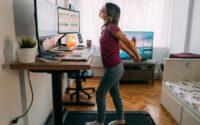Study reveals why it may not be a good idea to take lengthy naps
Is there such a thing as the perfect nap?
A study published in the Obesity research journal found that longer naps were associated with an array of negative impacts on one’s health.
Researchers at the Brigham and Women’s Hospital in Boston evaluated the sleep and health patterns of 3,275 adults from the Spanish region of Murcia, where siestas (afternoon naps often after lunch) are part of the culture.
Of the thousands of adults that participated in the study, 35% took siestas often, with 16% of them usually snoozing for 30 minutes or more.
Compared to those who did not doze off during the day, long siesta-takers were found to have a higher body mass index, waist size, higher blood pressure and an overall prevalence of metabolic syndromes — all of which are linked to obesity, diabetes and heart disease.
Longer naps were also associated with later bed and meal times, with increased intake at lunch and cigarette smoking, which may lead to the higher health risks.
However, those who rested for less than 30 minutes (a power nap) did not appear to have an increased risk for obesity and these other metabolic concerns.


Short siesta-takers were less likely to have elevated blood pressure than those who did not take a nap at all.
Power naps have also been proven to lead to a plethora of mental and physical health benefits, such as helping to increase energy, alertness, productivity and one’s mood.
“Not all siestas are the same. The length of time, position of sleep, and other specific factors can affect the health outcomes of a nap,” senior author Marta Garaulet, a visiting professor in the Division of Sleep and Circadian Disorders at Brigham and Women’s Hospital, said in a press release.

Garaulet and her team found that siestas were associated with an increased risk of obesity when studying a UK population but have called for continued research into the connection between nap lengths and metabolic health.
The importance of sleep has been studied and debated for years with experts touting their do’s and dont’s but the need for more research persists as concerning diseases and illnesses continue to rise.
Today obesity affects over 1 billion people around the world, diabetes is on track to surge 700% in young Americans and heart disease is the leading cause of death for men, women and people of most racial and ethnic groups in the US.
Therefore, research into any facet of possible connections to these worrying trends is increasingly important.

As people are becoming more conscious about the value of sleep, many couples are getting a sleep divorce.
Partners can sometimes disrupt a good night’s sleep whether it be from snoring, blanket hogging or setting an alarm earlier than your wake-up time due to different schedules.
Social media users have even started to talk about the phenomenon, with 356,400 views for the hashtag #SleepDivorce on TikTok and experts are supporting these sleep separations.
While optimal sleeping patterns may still be up for debate, the science seems to show that you don’t need to feel too guilty about sneaking away for a quick after-lunch snooze. It’s the doctor’s orders.


